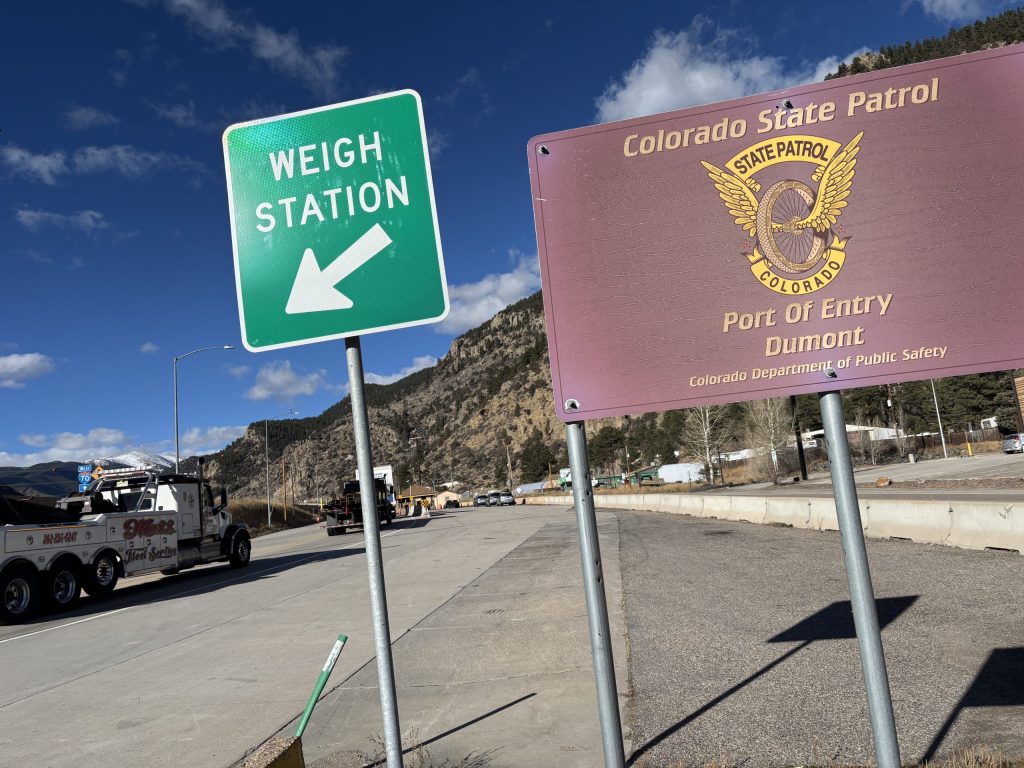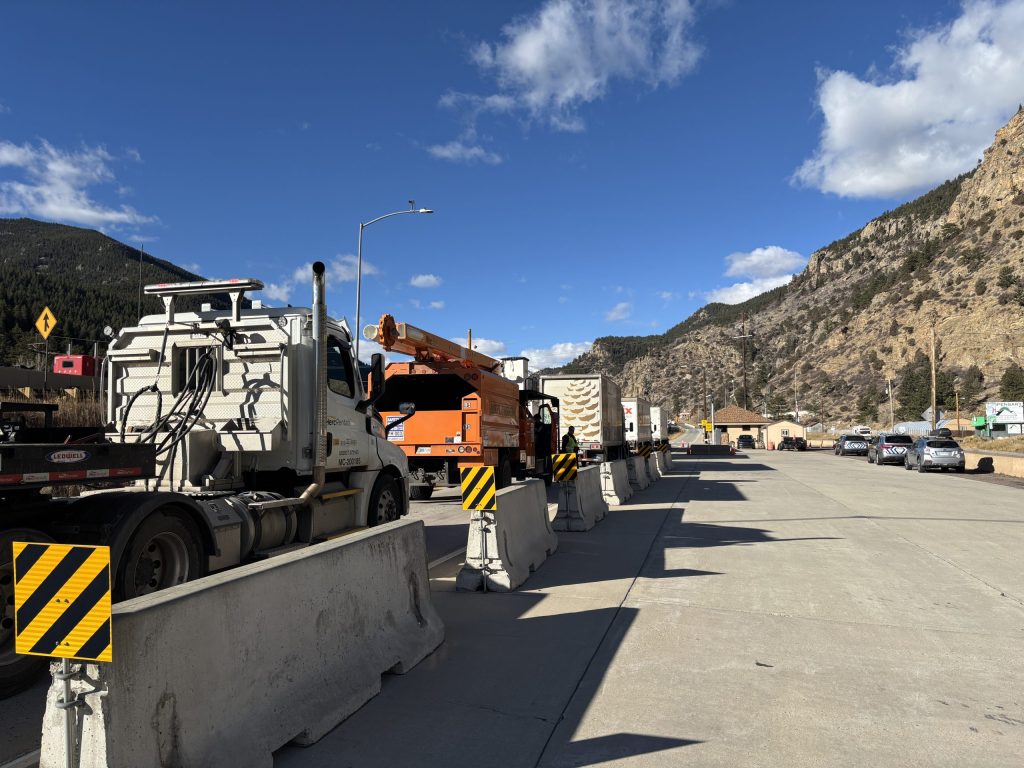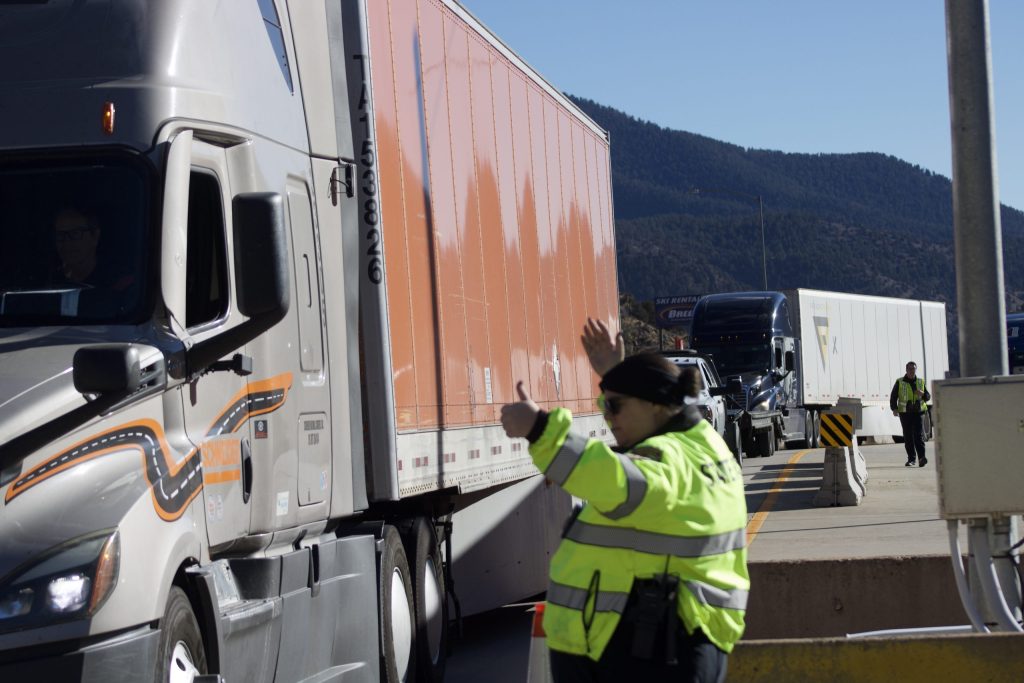Colorado State Patrol’s chain law enforcement operations are in full swing — even if winter isn’t
Description
Diesel engines rumbled and the smell of exhaust hung in the air on Wednesday as semitrailers, dump trucks and other large commercial vehicles pulled off Interstate 70, lining up at the Dumont Port of Entry.
Despite sunny blue skies and unusually warm weather for November, state troopers and port of entry officers inspected every truck, asking each driver a simple question: Are you carrying chains?
“It’s Colorado. You never know what the weather’s going to be,” said Amy Hosier, Colorado State Patrol’s district supervisor at the Dumont Port of Entry. “They have to be prepared for anything. It’s been in the statute for years now that no matter what the weather is, starting Sept. 1, they’re required to carry chains.”
Colorado’s mountain roadways are not only steep and winding, but can experience extreme winter weather nine months of the year. For commercial motor vehicles, which make up about 10% of traffic on I-70, these roads can be challenging any time of year, but winter can be especially dangerous.
Because of the unpredictable weather, Colorado has a commercial vehicle chain law requiring all vehicles over 16,000 pounds to carry chains at all times when driving in the mountains between Sept. 1 and May 31.
In 2024, Colorado expanded the number of roadways where the commercial vehicle chain law applies to include I-70 west of Mile Post 259 at Morrison, Colorado Highway 9 between Frisco and Fairplay, U.S. Route 285 from Morrison to the New Mexico border, U.S. Route 50 from Salida to the Utah border and Route 40 from Empire to the Utah border, among others.
Colorado also has a passenger vehicle traction law, which requires four- and all-wheel drive vehicles to have mud and snow, winter or all-weather tires and two-wheel drive vehicles to have chains or an approved alternative traction device during the winter months.
<figure class="wp-block-image size-large">
 <figcaption class="wp-element-caption">Trucks pull in at the Dumont Port of Entry on Wednesday, Nov. 19, 2025.</figcaption><figcaption>Ryan Spencer/Summit Daily News</figcaption>
<figcaption class="wp-element-caption">Trucks pull in at the Dumont Port of Entry on Wednesday, Nov. 19, 2025.</figcaption><figcaption>Ryan Spencer/Summit Daily News</figcaption>“Colorado’s chain and traction laws exist to prevent closures, crashes and long delays,” Colorado Department of Transportation communications lead Stacia Sellers said. “Most winter shutdowns on steep grades begin with just one unprepared vehicle.”
Enforcing chain law
Last spring, the Colorado State Patrol began conducting proactive chain law enforcement operations in an effort to increase compliance and ensure some of the heaviest vehicles on our roads are equipped for winter travel.
At the DuMont Port of Entry, just a few miles past where the commercial vehicle chain law kicks in heading into the mountains, Hosier said the State Patrol has conducted chain checks weekly since September.
On Wednesday, every vehicle over 26,000 pounds was required to stop at the DuMont Point of Entry. Spread out along the line of trucks, a half dozen port of entry officers checked each truck for chains.
Some of the vehicles had chains dangling underneath their trailers, already visible to the officers, who waved them along with a thumbs-up. Other times, the officers stopped the driver to talk.
“Do you have chains?” one officer shouted to the driver of a blue semitrailer, over the roar of the engine.
“Yeah, I have six in a black box in the back,” the driver replied.
“Can I see them?” the officer asked.
The driver hopped out of the semitrailer and fished through a box between the cab and the trailer to show the officer the chains.
While most of the truckers that passed through had chains, the officers wrote a $135 citation to those who did not for violating the commercial vehicle chain law. And, it’s not just the driver’s pocketbooks that their failure to comply impacts.
<figure class="wp-block-image size-large">
 <figcaption class="wp-element-caption">Semitrailers and other large commercial vehicles join the queue at the Dumont Port of Entry on Wednesday, Nov. 19, 2025. In addition to conducting chain law enforcement operations weekly, port of entry officers here are weighing vehicles, ensuring drivers have a valid commercial driver’s license and verifying oversize and overweight permits.</figcaption><figcaption>Ryan Spencer/Summit Daily News</figcaption>
<figcaption class="wp-element-caption">Semitrailers and other large commercial vehicles join the queue at the Dumont Port of Entry on Wednesday, Nov. 19, 2025. In addition to conducting chain law enforcement operations weekly, port of entry officers here are weighing vehicles, ensuring drivers have a valid commercial driver’s license and verifying oversize and overweight permits.</figcaption><figcaption>Ryan Spencer/Summit Daily News</figcaption>Hosier explained that each company also has a safety rating associated with its U.S. Department of Transportation number. The more violations a company’s drivers rack up, the worse the company’s safety rating, which can have implications for their business.
On Wednesday, the chain law enforcement operation at the Dumont Port of Entry inspected around 300 vehicles and issued citations to 31 vehicles without the required chains.
“Generally on a typical day we’re seeing about 88% compliance is what we found,” Hosier said. “We’re still finding a decent amount of (commercial vehicles not carrying chains). The majority of them are from out of state that don’t realize they have to carry chains or just didn’t stop to get chains.”
Activating chain and traction laws
When roads are icy or snow-packed, the Colorado Department of Transportation, in coordination with the Colorado State Patrol, can “activate” the commercial vehicle chain law and passenger vehicle traction law to require drivers to put chains on their vehicles.
<figure class="wp-block-image size-large">
 <figcaption class="wp-element-caption">A port of entry officer gives a thumbs up to a semitrailer on Wednesday, Nov. 19, 2025, waving it along, after spotting chains dangling from underneath the vehicle. Large commercial vehicles are required under Colorado state law to carry chains for at least four tires.</figcaption><figcaption>Ryan Spencer/Summit Daily News</figcaption>
<figcaption class="wp-element-caption">A port of entry officer gives a thumbs up to a semitrailer on Wednesday, Nov. 19, 2025, waving it along, after spotting chains dangling from underneath the vehicle. Large commercial vehicles are required under Colorado state law to carry chains for at least four tires.</figcaption><figcaption>Ryan Spencer/Summit Daily News</figcaption>On a snowy day when chain law is activated, Hosier said that commercial vehicles are still required to stop at the port of entry, but will not only have to be carrying chains, but will also have to have them on at least four tires.
“If they don’t have them on, they’re receiving a $500 citation, which with surcharges is a little over $600,” Hosier said. “Then, they cannot continue further unless they purchase chains or the chain law gets lifted.”
If a semitrailer fails to chain up when chain law is activated and then causes a crash or blocks traffic, the driver can receive a $1,000 citation under the state’s commercial vehicle chain law.
Across Colorado, including along the I-70 mountain corridor, CDOT has variable message signs that alert drivers when chain and traction laws are activated, Sellers said. Drivers can al




